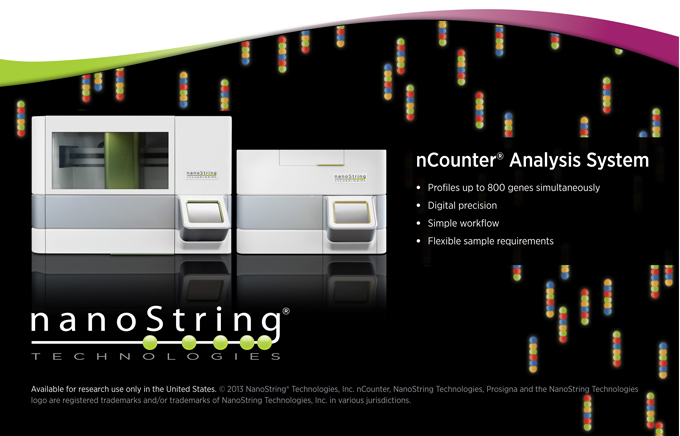Just a few days after Tableau wowed Wall Street with a spectacular IPO, another Seattle company is looking to make the leap into the public marketplaces.
This time, it is NanoString Technologies, a maker of genomic analysis tools. NanoString was spun out of genomics pioneer Leroy Hood’s Institute for Systems Biology in 2003.
The 138-person company is looking to trade on the Nasdaq under the ticker NSTG, and raise up to $86 million.
NanoString is losing money, showing a net loss of $17.7 million last year, and a first quarter loss of $7.2 million. In fact, the company has never made money, and it is reporting a total accumulated deficit of $102.8 million since it was founded.
“We expect that our losses will continue for at least the next several years as we will be required to invest significant additional funds toward development and commercialization of our technology,” the company wrote in its S-1 filing.
Revenues were just $22 million last year — about $100 million less than Tableau’s.
Of course, in the biotech and life sciences arena, huge losses and minimal revenue are more expected. Nonetheless, it will be interesting to see how Wall Street reacts once the shares price.
 NanoString, which is the pioneer of a molecular barcoding technology, raised $15 million in venture capital financing last December from Clarus Ventures, Draper Fisher Jurvetson, OVP Venture Partners, GE healthymagination Fund and BioMed Ventures. It is now led by former Genzyme Corp. exec Brad Gray, who owns 4.77 percent of the company.
NanoString, which is the pioneer of a molecular barcoding technology, raised $15 million in venture capital financing last December from Clarus Ventures, Draper Fisher Jurvetson, OVP Venture Partners, GE healthymagination Fund and BioMed Ventures. It is now led by former Genzyme Corp. exec Brad Gray, who owns 4.77 percent of the company.
Clarus owns 36 percent of the company, while OVP holds 23 percent and DFJ holds 20 percent.
The company’s nCounter technology is used by more than 100 different research organizations, and NanoString also launched Prosigna in Europe and Israel in February to help patient’s get a better sense of the risk of recurrence for breast cancer. It is currently attempting to get Prosigna approved in the U.S.
But NanoString is best known for its nCounter Analysis System, which digitally quantifies “the activity of up to 800 genes simultaneously in a single experiment.”
“The sensitivity and precision of our novel barcoding chemistry allows researchers to measure subtle changes in genomic activity efficiently, which is essential because tissue samples are often available only in very small quantities,” the company writes in its IPO filing. “This problem is especially acute in cancer research, which is typically conducted using biopsies that are often stored in a format known as formalin-fixed paraffin embedded, or FFPE, which complicates subsequent analysis of genetic material. The nCounter Analysis System is an easy-to-use and flexible solution that allows researchers to efficiently test hypotheses across thousands of different samples.”
More details in the S-1 filing.


